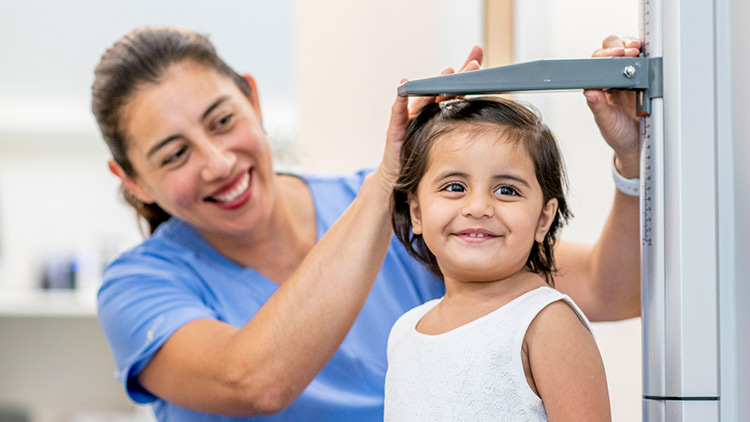Healthy kids

The routine growth assessments of children’s height and weight is a critical strategy to increase awareness of clinicians and parents about childhood obesity. All children aged 0-16 years who are in contact with any health facility on the Mid North Coast should be weighed and measured every 3 months.
Online tools and NSW Health resources are available to support health professionals to perform growth assessments, provide brief lifestyle advice and referral to health programs and services. There are also MNCLHD resources, which have been co-designed with local health professionals.
Healthy Kids for Professionals is a NSW Health website which provides online tools and resources to health professionals to manage children who are above a healthy weight, and their families.
8 Healthy Habits resources have been created for clinicians to support families to maintain an healthy lifestyle.
8-Healthy-Habits-resource-0-12months
Small Bites for Big Steps
NSLHD have developed on-demand videos with bite-sized practical pieces of information on the healthy development of children aged 0-5years, categorised into age groups. These videos provide support for health professionals and families and can be accessed here: Small Bites for Big Steps (nsw.gov.au)
Small Bites for Big Steps Poster for Clinicians
First 2000 Days Webinar Series
Professional development sessions developed by MNCLHD for health professionals, which provide information and resources on supporting families with health priorities in the first 2000 days. The webinar series can be accessed here: First 2000 Days – Mid North Coast Local Health District (nsw.gov.au)
First 2000 Days Webinar Series Poster for Clinicians
Growing Healthy Eaters
SESLHD have developed a video to support families with tips on responsive feeding and the meal environment.
This can be accessed here: Growing Healthy Eaters – YouTube
Health Professionals perceptions of conducting routine growth assessments
Emma Schwartzkoff from MNCLHD Health Promotion has conducted a study exploring allied health professionals’, nurses’ and doctors’ perceptions of conducting routine growth assessments and providing lifestyle support to families in MNCLHD. The study can be accessed here: What are health professionals’ perceptions of conducting routine growth assessments and lifestyle interventions? A qualitative study involving allied health professionals, nurses and doctors in rural and regional New South Wales (csiro.au)
The Obesity Collective have co-designed an e-Learning module Understanding the Science and Reality of Obesity for Better Patient Care, to share information about the science of obesity, personal experiences of patients and healthcare professionals, quick tips for best practice and opportunities to reflect on your practice. Positive interactions with a healthcare professional can help patients better understand the science and complexity of obesity, their personal health risks, and their options in a more empowered way.
Access the module here: E-Learning Module – The Obesity Collective
The Obesity Collective have also developed other resources to support with reducing weight stigma:
The PICNIC program supports new parents feeding their infants and toddlers on the Mid North Coast. PICNIC supports the feeding journey, making it healthier, happier and easier.
PICNIC is a peer education program. This means that the PICNIC team provide nutrition/feeding training, information and support to parents who volunteer to be part of the program (PICNIC parent). PICNIC parents can then pass on this information and provide feeding support to other parents within their social groups.
PICNIC resources are available to anyone via the website or you can follow us on Facebook and Instagram.
PICNIC 3 – 6
Age group: 3 to 6 years
PICNIC 3 – 6 is a pilot program for families with kids aged 3 to 6 years old that will focus on healthy eating and being active. The program is yet to start – more information will be available soon.
Go4Fun is a free program for NSW children to become fitter, healthier and happier, while having fun, meeting friends and learning new skills. The face-to-face program runs once a week for two hours over a 10 week period.
Aboriginal Go4Fun was developed in partnership with Aboriginal communities and is delivered by local Aboriginal organisations together with NSW Health. The program encourages the whole community to join in.
Go4FUN Online is perfect for families who cannot make it to the face-to-face program but still want to learn about healthy lifestyles.
Age group: 13 to 18 years
HEALTH4ME is a free 6-month healthy lifestyle text message based support program, open to all young people aged 12-18 years who have an active mobile phone.
Age group: 12 to 18 years
TEXTBITES is a research study aiming to find out if a fun and supportive text message program can help young people lead a healthier and happier lifestyle. The text messages have been developed with young people for young people. Participants in the intervention group receive interactive information and advice on areas such as nutrition, physical activity and wellbeing.
Age group: over 16 years
The Get Healthy Service is a free telephone-based health coaching service that can provide you with the support and motivation you need to reach your own healthy lifestyle goals related to:
- eating healthy
- getting active
- how to maintain a healthy weight
- reducing alcohol consumption
- pregnancy health.
A qualified health coach will support you over six months to make changes through personalised helath goals.
Age group: 0 to 5 years
Early childhood nurses provide services for new parents. The nurse can provide advice to promote healthy growth and development including guidance around age appropriate feeding practices and activities for you and your child.
The role of the dietitian is to provide individualised nutrition assessment, recommendations on dietary modification and to provide education to the patient and career as appropriate.

